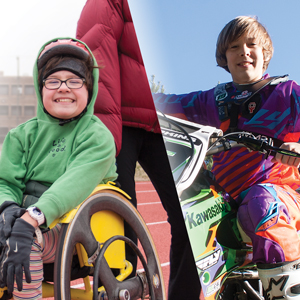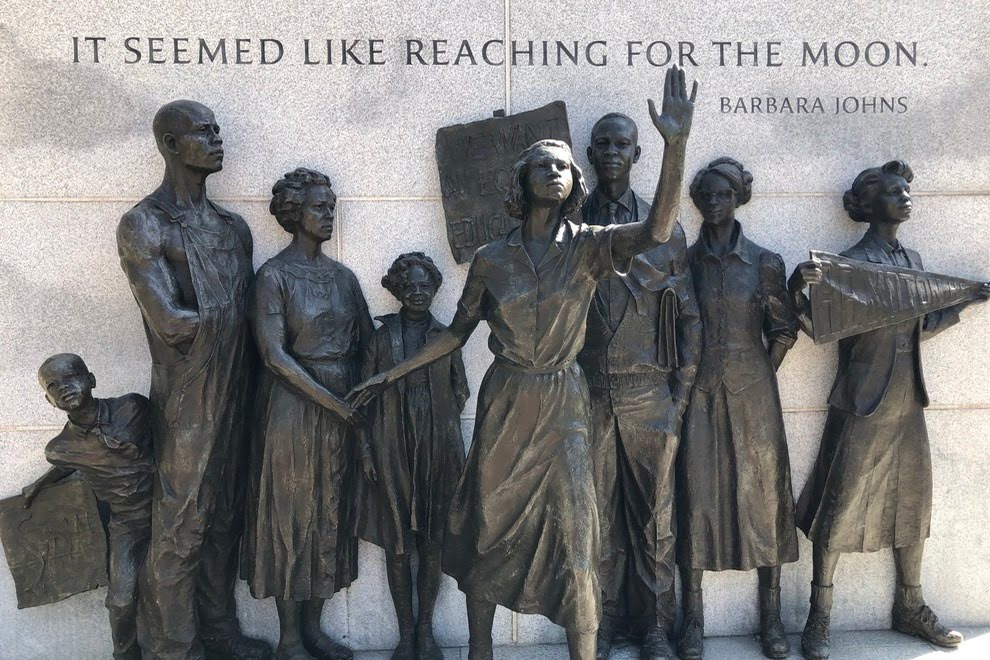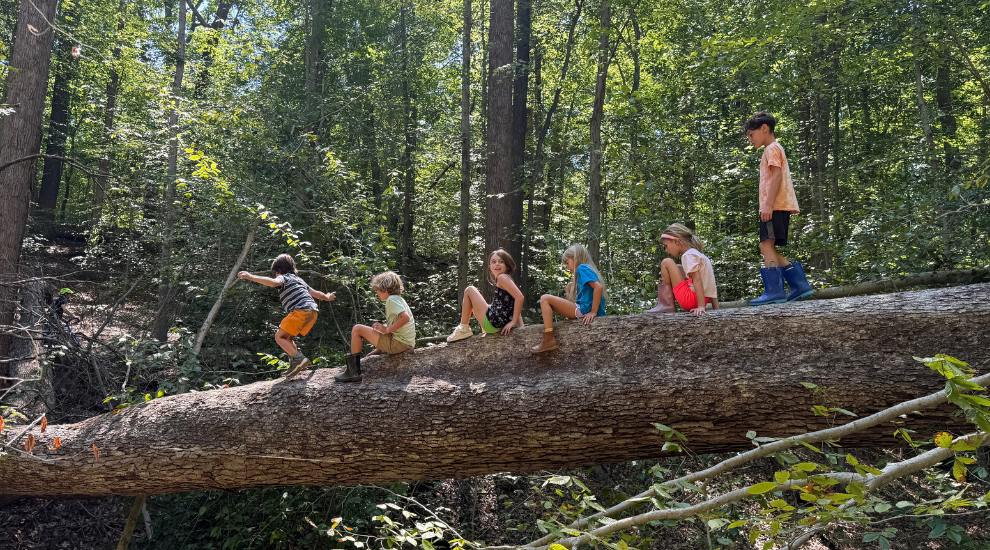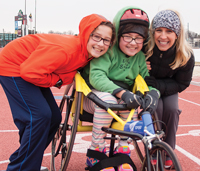
She’s a Power Kid!
The minute John Turner, a Richmond pathologist, met eleven-year-old Taylor Bernard he felt compelled to “be in her corner.”
“She is one of those people you just admire,” says Dr. Turner who is coaching Taylor for an upcoming triathlon. “I feel like I am a better person because I have been able to spend time with her.”
Dr. Turner isn’t the only person who feels that way after meeting the upbeat fifth grader. Here’s what people notice when they meet Taylor: She is an articulate, captivating storyteller with a fun, devilish twinkle in her eye. Her dark curls dance around her face every time she flashes her joyful, soul-grabbing smile, and her positive attitude is as contagious as it is inspirational.
What people don’t notice at first is the fact that she has cerebral palsy. “Taylor is one of the most optimistic, positive, happy individuals I know,” says her mom, Leigh. “Despite all of her challenges, she loves life and lives her life to the fullest.”
Taylor was diagnosed with cerebral palsy, a disorder that involves brain and nervous system functions, a month after her birth. She and her twin sister, Sydney, who does not have cerebral palsy, were born prematurely. “Essentially, the brain does not effectively communicate with Taylor’s muscles,” says her mom, Leigh. “The hardest part about the initial diagnosis was the uncertainty of how severe her CP would be. It was devastating news, a parent’s worst nightmare. Knowing that your child may never walk and do all of the things that we take for granted is awful.”
But Taylor doesn’t let cerebral palsy define her. She leads an active life even though she is in a wheelchair. She takes therapeutic horseback riding lessons, swims, and is training for a triathlon. In 2010 she represented Virginia in the national art contest, Very Special Arts, and had her watercolor sunset displayed at Union Station in Washington, DC.
Taylor, who is enrolled in the gifted program for reading, writing, and language Arts at Shady Grove Elementary, is a member of the SCA as well a spelling bee whiz. She also designed and campaigned for the establishment of a mentoring program for children with autism. “She is one of the smartest people I know,” says Dr. Turner. “She carries on a conversation and has a level of sense of humor that is uncommon for people of any age. She’s one of those people you want to be around and admire.”
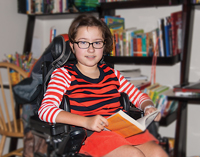
Part of Taylor’s strength lies in that fact that the word “no” is not in her vocabulary. “I don’t let a lot of obstacles get in the way,” she says with a smile and a maturity level that far exceeds her age. Some people classify Taylor as an old soul. “She’s very intuitive and perceptive and can help you solve any relationship problem you have, no matter how old you are,” her mom says.
Taylor has participated in various sports through Sportable, an organization that provides people with physical disabilities with opportunities to participate in sports programs. One of her favorite activities is swimming. “I am so mobile in the water,” she says. “My whole mood changed after I was swimming. It was so much better.”
Kristen Lessig, co-founder and executive director of Sportable, is proud of Taylor’s accomplishments in the pool. “We focus on her abilities and what she can do, not what she can’t do,” Lessig says. “When she got in the pool and started training with the coaches she said, ‘For the first time I feel like an athlete.'”
Taylor also enjoys horseback riding. She rode in her first therapeutic riding horse show events – pole bending, trail riding, equitation, and dressage – in 2011, winning her division. “When you’re trotting,” she says, “it feels like the horses’ hooves are off the ground and I am in the air.”
When she participates in the Powerkids Triathlon in May, she will compete in hand cycling, swimming, and wheelchair racing. “I can’t wait,” she says, adding that she hand-cycled three miles in the Vision Walk on the boardwalk in Virginia Beach last year.
Being involved in activities with Sportable has been “life changing” for Taylor. “It was a huge opportunity for me to branch out and meet people,” she says. “I want to have a lot of new and interesting experiences and opportunities. To me that makes me a better person. The work I do at Sportable and being a mentor with the autistic program Has really helped me.”
In an effort to teach her fifth-grade classmates more about adaptive sports, Taylor helped plan an in-school Sportable event that featured several activities. “I wanted them to see that even though it’s harder to do things in a wheelchair, you could still have a good time doing sports,” she says.
Away from the sports arena, Taylor is an avid reader who enjoys the young adult novels of best-selling author John Grisham. “His books have influenced me to be a lawyer,” Taylor says. Leigh Bernard can definitely see her daughter in that role. “She wants to be an attorney and help individuals with disabilities, like herself,” Leigh says. “She is an excellent communicator – both verbal and written.
That, coupled with her passion and determination, I think bode well for her aspirations as an attorney.” Taylor uses her reading skills to mentor autistic students at her school. It was that passion for helping others that gave her the idea to start the mentorship program in the first place. She wants other students in school to realize that children who have autism or other disabilities are no different than anyone else. “People have come to accept that with me,” she says. “I have showed them and I have explained.”
Laila Marshall, exceptional education lead teacher at Shady Grove Elementary, appreciated Taylor’s proposal for the program. “We thought it was a great idea because we want to increase awareness and tolerance at the school,” Marshall says. “We are trying to pilot the program.”
Marshall sees Taylor, who was profiled as an inspiring Virginian on WCVE’s Virginia Currents, as a positive role model for other students. “It’s very important for her to be more independent and show everybody she can do things like everyone else,” she says. “She has a lot of self-awareness for someone her age. She advocates well for herself, which is a difficult skill even for adults to have.”
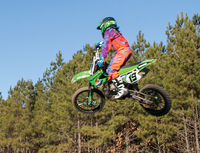
Leigh Bernard has always told Taylor to never let anything, including her disability, get in the way of what she wants to accomplish. “She may have to go about a task in a different way but she will get to the end result,” Leigh says. “The word no really isn’t in our vocabulary. Instead we figure out a way to make it happen.”
He’s Going Places!
Eleven-year-old Eli Hopkins Jr. Is as comfortable maneuvering a Kawasaki motocross bike around a challenging course as he is delivering a motivational speech to a crowd of five hundred. A two-time ATV national champion, Eli divides his spare time between competing on the dirt bike circuit and volunteering for both the American Diabetes Association and the Juvenile Diabetes Research Foundation.
Eli may be smaller in stature than some of his classmates but his spirit and fortitude tower above the crowd. Slim and stylish with wispy sandy blonde hair, this kid could easily be mistaken for a model, but that’s not the recognition he’s looking for. He wants two things in life: To become a professional motocross rider, and to help raise awareness and money in the effort to cure diabetes.
Eli began his racing career at the age of five, competing on the ATV circuit. “When Eli started riding, my husband was right beside him, coaching him,” says his mom Amy. “Now that he has switched to dirt bikes it’s a whole new deal. He’s going from four wheels to two.”
The ambitious fifth-grader has well over a hundred awards. He won back-to-back national championships in 2010 and 2011 and also appeared on the television show ATV 24/7 on Versus Network, featuring four-wheel and motocross races. “It was fun,” he says. “I felt like I was famous.”
Eli found out he had type 1 diabetes when he was seven years old, just two years after he started competing in the ATV circuit. His mother felt something was wrong when her young son complained that he stayed thirsty and was constantly going to the bathroom. “I didn’t think about diabetes because there was no history of diabetes,” she says. “That never crossed my mind.”
The diagnosis came after Eli suffered a double ear infection and his grandmother, who uses a glucometer at home, tested his blood sugar. By the time he got to the emergency room his sugar was 675 – normal levels should be less than 180 after Meals. “It was overwhelming,” his mom says. “I thought ‘How are we ever going to do this? This is going to change Eli’s everyday life.'”
But Eli never let the diagnosis interfere with his life. “He has always put forth his best effort,” his mom says. “He is always positive.”
Eli’s daily routine includes up to eight insulin shots a day. “I used to be nervous to give myself a shot because I was afraid I would give myself too much or not enough,” he says. “I’m learning how to do it now. I have a nurse that helps me out at school.”

When he’s not at school, he practices his motocross skills on the track that his parents built at their home in King William and travels to circuit practices or competitions every weekend. People associated with the sport have told his mom that Eli is “an amazing talent” but she still gets nervous when he competes. “I know Eli’s capabilities,” she says. “He’s a smart, clean rider but he’s on a really fast dirt bike.”
Since he started riding competitively, Eli has traveled to 32 states across the country. His farthest point: Minnesota. “That trip took 28 hours,” he says, adding that he won that race.
Before and during races, Eli checks his blood sugar levels to make sure he keeps them maintained. The exercise he gets from the sport is beneficial. “The more I exercise the better my sugars get,” he says.
Eli’s nana, Charlotte Perkins, travels with the family to races. After he was diagnosed with diabetes, Eli asked her to buy 150 JDRF bracelets. When she asked why, he told her he “wanted to give them out to all the other kids and professionals that race so they can understand about juvenile diabetes.”
Perkins got the bracelets for her grandson and Eli handed them out. A while later, a family came up to Eli during an event in Tennessee and asked if he would talk to their daughter who was just diagnosed with diabetes. Eli was happy to share his experiences. “Instead of feeling sorry for himself, he wants kids to know that you can do whatever you want to do,” Perkins says.
Perkins is Eli’s biggest fan, both on and off the track. “He is one of the kindest, most polite, and gentle children I have met in my life,” she says. “He never lets juvenile Diabetes slow him down or stop him. He never thinks why me. He never complains and that is why he is my little hero.”
Eli has been volunteering with the ADA and JDRF for the past few years, helping with the ADA’s Step Out: Walk to Stop Diabetes fundraiser and the organization’s annual Garden Party, slated for May 10 this year. “He is a great little speaker and a very good spokesperson,” says Nancy Castrina, area director for the American Diabetes Association Central Virginia Office. “We all fell in love with him immediately. He was so personable and mature for his age. There is nothing shy about him, which is good.”
She thinks Eli is a great fit to help out once again with Subway’s summer campaign to raise money for the ADA. The 2012 campaign in Central Virginia raised $80,0000. “We took Eli and Dylan White [who also volunteers for the ADA] around to as many Richmond area Subways as we could,” Castrina says. “He and Dylan were the faces of diabetes. They talked to the staff and owners, if they were there, and they talked to other customers. They thanked them for what they were doing for the ADA.”
Last year, Eli was named one of the 2012 Allen & Allen Hometown Heroes because of his volunteerism, academic abilities, and achievements. That type of recognition doesn’t come as a surprise to Perkins. “He makes an honest role model,” she says of her grandson. “He doesn’t let his disease get him down. He’s made me become a better person.”
Eli isn’t in it for the fame, he says.”I just want to encourage people to help find a cure for diabetes and to tell people who have diabetes that they can achieve the goals they want to achieve. Diabetes doesn’t stop you.” It certainly hasn’t stopped Eli.


